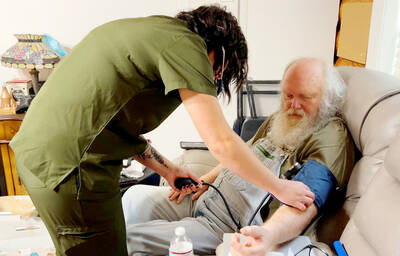I am always wary of people trying to make overlarge statements, and this is what Malaysian-Chinese artist H.H. Lim
One of the first warning signs that Lim's trying to say too much comes in an essay that explains the installation for those who don't "get it," which I'd assume is just about everybody. It says that through this show, Lim intends to "present his views on the world change for the latest year," which included a number of "drastic events, such as New York's 911 tragedy, [the] Israeli war, [the] EU's impact on economics, and natural disasters brought by global climate changes."

A couple of logical nonsequiturs follow, like that since these are problems that "we can only `see' but cannot `speak,'" sign language will be used to specially "interpret" these events (this is a fallacy because sign language expresses thoughts just as any other language does).
To make a quick note of what Lim has done for the exhibition: he has painted the gallery's walls burgundy and on top of that ground has traced textbook style illustrations of generic figures performing sign language in thin, white outlines. There are also several plaques, some picture-sized and hanging on the wall and two two-meters tall and leaning against it. The plaques are embossed with words -- some English and some Italian -- that are printed in reverse so that they could be viewed properly with a mirror.
In all of this language play, Lim seems to be batting at concepts -- much like a blindfolded person bats at a pinata -- from that tirelessly trendy body of thought, post-structural French literary criticism. Specifically, he's bobbling with a paradox of language that goes: the ultimate goal of language is to communicate, but unfortunately, language is an ultimately imperfect tool for communication. So -- and this is what I think he's trying to say -- we have seen a year of extraordinary and calamitous change, but the events themselves were ineffable, and no language we have can adequately express what it means to have seen or experienced them.
But to express that, what he does is put a line drawing of a tank on a wall to represent all the tragedy in all of last year's wars. It is nothing less than incredibly and grossly inadequate. So is juxtaposing against the tank a plaque bearing the word "vedere" (Italian for "to see") and a diagram of how to make the equivalent sign in sign language, all of which is supposed to tell you that seeing these events is the only way of truly understanding them. Basically, it looks like Lim has some big ideas, but he doesn't know how to get them across. So in the end Speechless doesn't say much.
IT Park is located at 2F, 41 Yitung St., Taipei. The exhibit runs through Sept. 28.

When Taiwan was battered by storms this summer, the only crumb of comfort I could take was knowing that some advice I’d drafted several weeks earlier had been correct. Regarding the Southern Cross-Island Highway (南橫公路), a spectacular high-elevation route connecting Taiwan’s southwest with the country’s southeast, I’d written: “The precarious existence of this road cannot be overstated; those hoping to drive or ride all the way across should have a backup plan.” As this article was going to press, the middle section of the highway, between Meishankou (梅山口) in Kaohsiung and Siangyang (向陽) in Taitung County, was still closed to outsiders

President William Lai (賴清德) has championed Taiwan as an “AI Island” — an artificial intelligence (AI) hub powering the global tech economy. But without major shifts in talent, funding and strategic direction, this vision risks becoming a static fortress: indispensable, yet immobile and vulnerable. It’s time to reframe Taiwan’s ambition. Time to move from a resource-rich AI island to an AI Armada. Why change metaphors? Because choosing the right metaphor shapes both understanding and strategy. The “AI Island” frames our national ambition as a static fortress that, while valuable, is still vulnerable and reactive. Shifting our metaphor to an “AI Armada”

US President Donald Trump may have hoped for an impromptu talk with his old friend Kim Jong-un during a recent trip to Asia, but analysts say the increasingly emboldened North Korean despot had few good reasons to join the photo-op. Trump sent repeated overtures to Kim during his barnstorming tour of Asia, saying he was “100 percent” open to a meeting and even bucking decades of US policy by conceding that North Korea was “sort of a nuclear power.” But Pyongyang kept mum on the invitation, instead firing off missiles and sending its foreign minister to Russia and Belarus, with whom it

The older you get, and the more obsessed with your health, the more it feels as if life comes down to numbers: how many more years you can expect; your lean body mass; your percentage of visceral fat; how dense your bones are; how many kilos you can squat; how long you can deadhang; how often you still do it; your levels of LDL and HDL cholesterol; your resting heart rate; your overnight blood oxygen level; how quickly you can run; how many steps you do in a day; how many hours you sleep; how fast you are shrinking; how